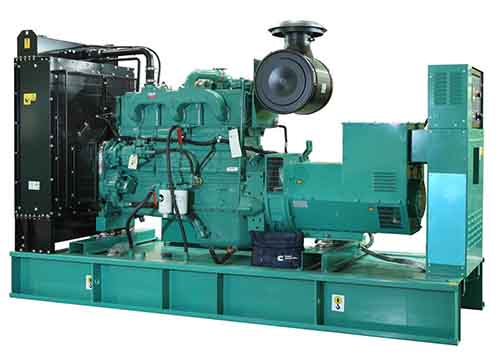Welcome to the website of Jiangsu Jiuyuan Power Equipment Co., Ltd
Welcome to the website of Jiangsu Jiuyuan Power Equipment Co., Ltd

2024-11-24
diesel generator set factory is essential for manufacturing reliable and efficient power generation units. These factories produce diesel generators used in various industries to provide backup power or off-grid solutions. The role of these factories is to meet the growing demand for electricity, especially in remote areas or regions with unstable grids. The factory produces customized diesel gensets to cater to different needs, ensuring high performance and reliability. They are crucial for industries like construction, telecommunications, agriculture, and even residential use, where uninterrupted power supply is vital.
The manufacturing time of a diesel generator set typically varies between 4 to 6 weeks, depending on the size, specifications, and customization requirements. For standard models, the process can be faster, but for more complex or tailored units, the time might extend. It involves several stages, including engine assembly, generator integration, testing, and quality control. Factors such as demand, factory capacity, and supply chain efficiency also impact the production timeline. Advanced factories equipped with automated machinery and streamlined processes tend to shorten this period.
Setting up a diesel generator set factory can cost anywhere from $500,000 to $5 million, depending on the factory’s scale, location, and the level of automation involved. The primary costs include land acquisition, machinery, labor, raw materials, and compliance with local regulations. Investment in research and development for improving product efficiency and meeting environmental standards can also be substantial. While initial capital is high, the long-term profitability of a well-established diesel generator set factory can make it a rewarding investment, especially if the factory can cater to global markets.
For optimizing the manufacturing process of diesel generator sets, several tools and technologies can enhance efficiency. These include Enterprise Resource Planning (ERP) systems like SAP or Oracle, which integrate different aspects of production, from procurement to delivery. Manufacturing Execution Systems (MES) such as Siemens Opcenter or Rockwell’s FactoryTalk help monitor and control the production process in real-time. Additionally, advanced simulation software, such as Autodesk and SolidWorks, can aid in the design and prototyping phase, ensuring that the final product meets both functional and safety standards.
To reduce manufacturing costs, a diesel generator set factory can adopt several strategies. First, optimizing the supply chain to reduce material costs and improve inventory management is crucial30kw silent diesel generator set. Second, investing in automation and robotics can minimize labor costs and increase precision in assembly, reducing the likelihood of defects. Third, maintaining strong relationships with suppliers to negotiate better prices for components can further lower costs. Finally, implementing lean manufacturing principles and reducing waste during the production process can significantly contribute to overall cost reduction.
Ensuring high-quality standards in a diesel generator set factory involves implementing a comprehensive quality control (QC) system. This system should include regular testing of raw materials, in-process inspections during assembly, and final product testing before delivery. Certifications such as ISO 9001 and ISO 14001 help factories adhere to international quality standards. Additionally, adopting advanced testing equipment, including load testing and noise level monitoring, guarantees that each generator set meets both performance and environmental regulations. Consistent staff training on quality standards and best practices also plays a key role in maintaining quality.
To improve the efficiency of diesel generator sets, the factory can implement several design and engineering improvements. First, using advanced materials, such as high-strength alloys or composite materials, can enhance the durability and performance of key components like the engine block or alternator. Second, optimizing fuel consumption through improved engine design, better fuel injection systems, and hybrid technologies can help reduce operating costs. Additionally, incorporating modern cooling systems and noise reduction technologies can make the generators more environmentally friendly. Finally, using real-time performance monitoring systems helps identify inefficiencies and areas for further optimization.
diesel generator set factory should handle customer-specific orders by first clearly understanding the customer’s requirements, such as power output, operational environment, and special features. The factory should then provide tailored solutions and ensure that custom designs and features do not compromise the overall quality and performance. During the manufacturing process, close communication with the customer is key, especially for complex or large orders. Regular progress updates, quality checks, and flexibility in adapting to last-minute changes will help maintain customer satisfaction. Post-sale support, including warranty and maintenance services, is also crucial for ensuring long-term customer relationships.
To stay competitive, a diesel generator set factory must focus on innovation, product differentiation, and customer service. Continuous research and development (R&D) to create more efficient and environmentally friendly generators will help the factory stand out in the market. Offering value-added services, such as remote monitoring, predictive maintenance, and quick delivery times, can also provide a competitive edge. Additionally, building partnerships with international distributors and staying compliant with global regulations can help the factory expand its market reach. Leveraging digital marketing strategies to raise brand awareness and increase visibility is also vital in the modern business landscape.
The global demand for diesel generator sets has a significant impact on factory production schedules. High demand periods, such as after natural disasters or during industrial expansions, can lead to tighter production timelines and a need for faster delivery. To accommodate fluctuations in demand, factories must be flexible with their production schedules and maintain sufficient inventory levels of key components. Furthermore, market trends, such as the rise in renewable energy solutions, may affect the types of generator sets needed, prompting factories to adjust their offerings and focus on more fuel-efficient or hybrid models.
